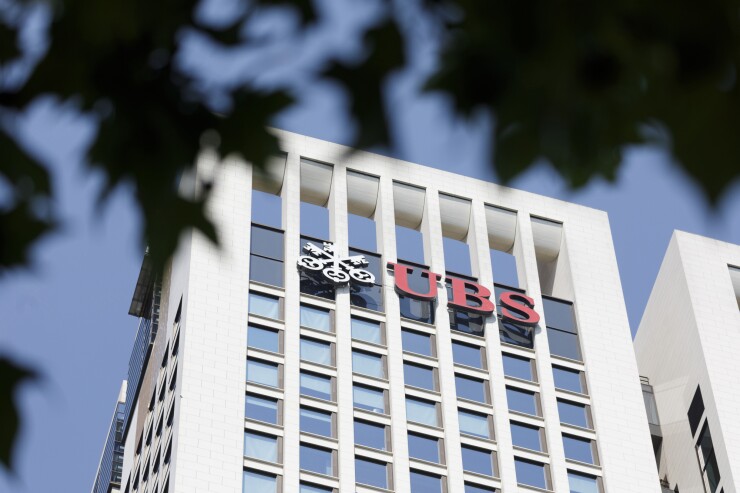UBS Group AG thought it had seen the worst of its French tax scandal when the lender was slapped with a record $5 billion penalty in Paris last month. A looming Swiss Supreme Court ruling could add to its woes.
The court will decide in the coming weeks on whether a lower administrative court was right to rule UBS didn’t have to hand over data on its French clients to authorities in France. If it disagrees, the names, birth dates and account balances of thousands of clients could be on their way to Paris, arming judges with fresh evidence to blunt the Swiss bank’s appeal of its conviction or giving prosecutors evidence to pursue fresh charges against UBS.
A quirk of French justice is that an appeal is essentially a fresh trial that offers more scope for new evidence to be introduced than a more narrowly defined legal challenge in London or New York. That creates the potential for not just an appeals court judge but also Paris prosecutors, known as the “parquet” in French, to seek a fresh case, say lawyers including Ludovic Malgrain, a partner with White & Case who’s not involved in the matter.

“Any transfer of data could be used by the appeals court for additional investigation but also by the public prosecutor for a new case,” said Malgrain, who is based in Paris. “There is a double risk here for UBS.”
It has taken more than eight years for the tax case to work its way up to Switzerland’s Supreme Court but the coincidental timing of the expected ruling could mean further headaches for the Zurich-based bank at the worst possible moment. UBS said its Feb. 20 conviction in Paris on charges of helping its French clients launder money was “extremely superficial, inconsistent and contradictory” and within 24 hours had filed an appeal of the conviction which came with a 3.7 billion-euro ($4.2 billion) fine and 800 million euros in damages.
UBS said last week that it has increased its provision for the case to 450 million euros, reflecting its “best estimate of possible financial implications.” A spokeswoman for UBS declined to comment ahead of the Swiss court decision. While the Supreme Court’s decision cannot be appealed in Switzerland, UBS could, in theory, appeal outside Switzerland to the European Court of Human Rights in Strasbourg, France.
Shares of UBS rebounded Monday from Friday’s decline, gaining 2.1 percent at 12:06 p.m. The stock fell 32 percent last year, worse than the 28 percent drop on the benchmark STOXX Europe 600 Banks Index.
Lawyers for Switzerland’s biggest lender were unusually critical of Judge Christine Mee’s February decision, calling it a “copy and paste job” of prosecution documents. That echoed what Denis Chemla, a lawyer for the bank, described during the Paris trial late last year as sloppy investigative work by prosecutors.
‘Nothing’
In his closing remarks, Chemla zeroed in on what he argued was a lack of emails, phone calls or other evidence incriminating the bank. “Here we have nothing, nothing at all. And so we are being told that “the Swiss don’t agree to mutual assistance, so there’s nothing we can do to demonstrate canvassing” of clients “to demonstrate tax evasion,”’ said Chemla. “But examining magistrates, did you ask the Swiss for mutual assistance, did you ever try? Never.”
Swiss federal prosecutors have regularly used their clout to extract data from local banks and shared it with their counterparts in the U.S. and Brazil as part of transatlantic probes into the Petrobras scandal and corruption at FIFA they were working on. The case before the Supreme Court, however, is a thornier one for Switzerland. While its national prosecutors aren’t involved, it goes to the heart of Swiss sovereignty, banking secrecy and the question of whether UBS must yield information about its clients to foreign governments.
Tax Office
France’s tax office filed requests to Switzerland at the end of 2012 and 2013 asking for information about recent taxpayers’ returns. Swiss federal tax authorities asked UBS to transfer the information in 2016, based on the request. UBS challenged the proceedings in court, saying France wasn’t specific enough about the data it was seeking.
Once the bank was made party to the French tax office’s request in 2016, it appealed to block the request before the Swiss Federal Administrative Court. Judges at that court handed the bank a victory last July, keeping thousands of French clients’ accounts details in Switzerland — for now.
The French had to failed to provide sufficient “grounds for assuming that the taxpayers involved have failed to comply with their tax obligation,” the court said. “Simply having an account in Switzerland” isn’t enough, the Swiss court concluded. “The explanations delivered by the French authorities were insufficient.”
Will the Swiss Supreme Court buy that argument, after France landed UBS with the largest penalty ever imposed on a Swiss bank? That may depend on how much attitudes to tax evasion have changed in Switzerland, said Stephane Bonifassi, a lawyer in Paris who specializes, in financial crimes and who’s not involved in the case.
“Swiss banks prospered with tax evasion and everyone tolerated it, but then, starting with the Americans, there was a paradigm shift in attitude to how seriously that would be prosecuted,” said Bonifassi. “I don’t think UBS recognized that paradigm shift.”
A clerk for Switzerland’s Supreme Court declined to comment on when a verdict may come.





